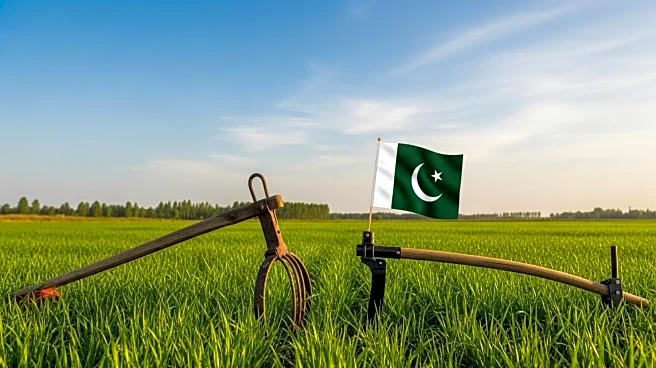What's Happening?
Pakistan and China have strengthened their collaboration in the agriculture sector by signing joint ventures (JVs) valued at $601.25 million. These agreements were finalized during the 2nd Pakistan-China B2B Investment Conference in Beijing, coinciding with the visit of Pakistan's Prime Minister. Key partnerships include a $500 million JV between Hitech Technological Concern of Pakistan and Weichai Lovol Intelligent Agricultural Technology Company of China, aimed at modernizing agricultural machinery and promoting smart farming solutions. Additionally, IMGC and Zhongzhihui Agriculture Development have agreed on a $100 million JV to enhance crop development and facilitate technology transfer. Buraq Tractors also signed a $1.25 million agreement with Xinyukun (Chongqing) Industry and Trade Co, Ltd to bolster local tractor manufacturing and after-sales services.
Why It's Important?
The signing of these joint ventures marks a significant step in Pakistan's efforts to modernize its agriculture sector, which is crucial for the country's economy. By partnering with Chinese enterprises, Pakistan aims to leverage advanced technology and smart farming solutions to increase productivity and efficiency. This collaboration is expected to facilitate technology transfer, improve crop yields, and enhance local manufacturing capabilities. The agreements reflect a broader trend of increasing economic cooperation between Pakistan and China, which could lead to further investments and development in other sectors. The modernization of agriculture is vital for Pakistan's food security and economic stability, potentially benefiting farmers and related industries.
What's Next?
Following the signing of these joint ventures, the involved companies are expected to begin implementing the agreed-upon projects, focusing on technology transfer and the modernization of agricultural practices. The success of these ventures could pave the way for additional collaborations between Pakistan and China in other sectors. Stakeholders, including government officials and industry leaders, will likely monitor the progress of these projects closely to assess their impact on the agriculture sector and the broader economy. The outcomes of these ventures may influence future policy decisions and investment strategies in Pakistan's agriculture industry.
Beyond the Headlines
The deepening of Pakistan-China cooperation in agriculture may have broader geopolitical implications, as it strengthens economic ties between the two countries. This partnership could influence regional dynamics, particularly in the context of Pakistan's relationships with other neighboring countries. Additionally, the focus on smart farming and technology transfer highlights the growing importance of innovation in agriculture, which could lead to long-term shifts in farming practices and sustainability efforts.








